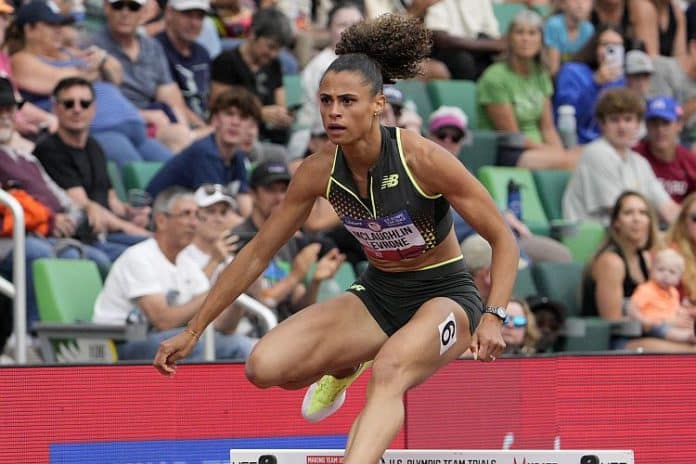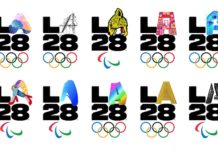
★ The Sports Examiner: Chronicling the key competitive, economic and political forces shaping elite sport and the Olympic Movement.★
★ To get The Sports Examiner by e-mail: sign up here! ★
★ Friends: Closer! Our 27 donors have covered 75.9% of our technical costs for the rest of 2024. Please help us across the finish line: you can donate here. You help is needed. ★
≡ U.S. OLYMPIC TRIALS:
TRACK & FIELD ≡
The final day of the U.S. Olympic Track & Field Trials in Eugene, Oregon left the focus on the men’s and women’s 400 m hurdles to finish the meet. Good idea.
After what was already a great final day, Olympic silver medalist Rai Benjamin lined up for the men’s 400 hurdles final, with CJ Allen to his outside in lane eight. And Allen went out hard, a perfect lead-out for Benjamin, who took the lead at 200 m, ran smoothly around the turn and then led into the straight.
Benjamin looked strong, but hardly straining, and the only question was the time, and he crossed in a world-leading 46.46, the no. 5 performance in history! He very much looked like someone who will challenge the world record – and world-record holder – Karsten Warholm of Norway in Paris.
Behind him, Allen kept strong and had a good grip on second into the straight, but with 2022 Worlds bronze medalist Trevor Bassitt catching up quickly. Allen held on to second with a season’s best 47.81 and Bassitt was just behind in 47.82. Alabama’s Chris Robinson, the 2023 NCAA champ for Alabama, was fourth in 47.96. Houston’s Caleb Dean, the 2024 NCAA winner, was third after hurdle seven, but fell and did not finish.
That brought up the women’s 400 m hurdles and world-record holder Sydney McLaughlin-Levrone, who had already claimed the world lead in the semifinals at 52.48. There were two races here: McLaughlin-Levrone against the clock and then the other two spots on the Olympic team.
McLaughlin-Levrone was out well, looking crisp and efficient, clearly in the lead and building. She came to the eighth hurdle with a 10 m lead, and then something amazing happened. Thanks to the timing chip technology, hurdle-by-hurdle splits were available and she timed 4.68 from hurdle seven to eight, 4.68 from eight to nine and then was FASTER to hurdle 10, in 4.65. Who can do that? Only Sydney.
The run-in was in 5.02 and she crossed in a world record of 50.65, her fifth in the event across four years, with Paris to come.
Behind her was Anna Cockrell, fifth at the Worlds last year, who ran second throughout the race and goes to her second Games with a lifetime best of 52.64 in second. The third spot was a duel between NCAA champ Jasmine Jones and two-time Worlds silver medalist Shamier Little. They were close throughout, but Jones passed Little on the straight and held on to get third, 52.77 to 52.98. Rio 2016 gold medalist and former world-record holder Dalilah Muhammad was sixth in 54.27.
The fantastic hurdles finishes concluded an Olympic Trials that provided nine world-leading performances in seven events:
● Men/200 m: 19.53, Noah Lyles
● Men/110 m hurdles: 12.92, Grant Holloway (heats)
● Men/110 m hurdles: 12.86, Grant Holloway
● Men/400 m hurdles: 46.46, Rai Benjamin
● Women/100 m: 10.71, Sha’Carri Richardson
● Women/200 m: 21.78, Gabby Thomas (semis)
● Women/100 m hurdles: 12.25, Masai Russell
● Women/400 m hurdles: 52.48, Sydney McLaughlin-Levrone
● Women/400 m hurdles: 50.65, Sydney McLaughlin-Levrone ~ World Record
There was drama absolutely everywhere. On the track:
● Men’s 5000 m: The headline was a match-up between 1,500 m winner Cole Hocker and 10,000 m winner Grant Fisher, who started in 81 F temperatures at 4:30 p.m.
Woody Kincaid, usually a fast finisher – but without the Olympic qualifying standard of 13:05.00 – broke away with 10 laps to go and had a 20 m lead on the backstraight. He was caught with eight laps left, but he had made race faster, and Fisher took over. Abdi Nur, on the 2022 and 2023 U.S. Worlds teams, took over with six laps remaining, but the pace receded from the Olympic standard.
Fisher and Nur broke away with three laps to go and stretched out to a 15 m lead on the backstraight with a 59.7 lap. They extended the lead to more than 30 m and took the bell more than 40 m up, with NCAA champ Parker Wolfe trying to break away with Harvard’s Graham Blanks for third.
Nur surged ahead with 250 m left, but Fisher got to the front with 100 m to go. Nur got even or just ahead, but Fisher surged and then held on to cross first in 13:08.85, with Nur at 13:09.01, a meet record for Fisher.
Wolfe got a lifetime best of 13:10.75 to get third, with Blanks at 13:12.61, a season’s best. Hocker was seventh in 13:20.99; Kincaid finished ninth in 13:31.40. Wolfe was 74th in the world rankings coming in, so his chances are modest.
● Men’s 800 m: No question about the favorite: World Indoor champ Bryce Hoppel. He controlled the race from the beginning, setting a fast pace ahead of Brandon Miller.
Hoppel and World Road Mile champ Hobbs Kessler were 1-2 at the bell, with Kessler moving up to run with his training partner. Miller, who was on the 2022 Worlds team, challenged for the lead and Hoppel surged to take over again, with 200 m to go. Hoppel led into the straight and ran away, with Kessler passing Miller with 50 m to go for second.
Hoppel was strong through the finish and blew up his lifetime best at 1:42.77, now no. 4 in the world for 2024 and now no. 3 in American history! Kessler got a lifetime best of 1:43.64, now no. 7 in the world for 2024, and Miller was at 1:43.97. Josh Hoey was fourth with a lifetime best of 1:44.12. All have the Olympic standard.
Kessler’s run at age 21 gives him spots in the 800 and 1,500 m, the first American to do it since Rick Wohlhuter in 1976!
● Women’s 100 m hurdles: This was a fight to the finish, with Tonea Marshall starting well in lane six and taking a small lead over NCAA champ Grace Stark keeping pace in lane eight. But the field came back and in the final third, it was Masai Russell, third at the nationals last year and on the 2023 Worlds team, who charged best in the middle of the track.
She was chased by Alaysha Johnson, the 2023 Pan Am Games bronze winner, to her right in lane five and they emerged from the pack on the run-in to finish in a world-leading 12.25 (+0.7) and 12.31, lifetime bests for both. Meanwhile, Stark – out in eight – leaned hard and got third, also in a 12.31 lifetime best.
Nia Ali, 35, the 2019 World Champion, was fourth in 12.37, with Marshall in 12.38 and Tokyo Olympic silver winner Keni Harrison in 12.39. A sensational race and Russell is now equal-fourth all-time, with the no. 4 performance in American history.
Johnson and Stark are both now equal-10th all-time and no. 5 all-time U.S. Wow.
● Women’s 1,500 m: Elle St. Pierre, the World 3,000 m champion and the 5,000 m winner, took over from the start and decided she had to wear out the kickers. Her relentless running had her in control at the bell, ahead of 2022 national champ Sinclaire Johnson.
The last lap was wild, with Tokyo Olympian Heather Maclean moving into second on the backstraight and defending national champ Nikki Hiltz moving up to contend. Everyone was sprinting with 200 m to go, with St. Pierre and World Indoor bronzer Emily Mackay fighting for the lead and Hiltz just behind. On the straight, those three were away and Hiltz had the most in her legs and got clear with 25 m to go, winning in a lifetime best of 3:55.53, no. 6 in the world for 2024 and the no. 2 performance in American history.
Mackay got a lifetime best of 3:55.90 in second, the no. 3 mark in U.S. history and St. Pierre was third in 3:55.99, a lifetime best by 0.01, the no. 3 U.S. performance.
Johnson was fourth, also with a PR of 3:56.75 (no. 5 all-time U.S.), with Cory McGee in 3:57.44 and Elise Cranny at 3:57.87. The top eight all got lifetime bests.
The field events were almost as insane:
● Men’s High Jump: This one did not follow the script at all, as world no. 2 JuVaughn Harrison – who had cleared 2.34 m (7-8) this season – went out after clearing 2.24 m (7-4 1/4) and finished fourth.
NCAA runner-up Tyus Wilson of Nebraska also cleared 2.24 m, and finished third on misses, but does not have the Olympic standard of 2.33 m (7-7 3/4). That left two men who cleared 2.27 m (7-5 1/4), Tokyo Olympian 2024 Worlds Indoor runner-up Shelby McEwen and NCAA third-placer Caleb Snowden of Arkansas-Pine Bluff.
McEwen, who has the standard, cleared 2.30 m (7-6 1/2) on his first try and Snowden could not match him, finishing second. Nevertheless, Snowden’s 2.27 m clearance was a lifetime best. McEwen tried 2.36 m (7-8 3/4) for a lifetime best, but missed all three tries.
As neither collegian has the standard and as Harrison is world-ranked no. 3, he’s likely headed to Paris anyway.
● Men’s Triple Jump: NCAA champ Salif Mane of Fairleigh Dickinson exploded as the 10th jumper in the first round, reaching a lifetime best of 17.28 m (56-8 1/2) and sailing past the Olympic standard, and no. 6 on the 2024 year list.
NCAA runner-up Russell Robinson of Miami, who got a lifetime best of 17.14 m (56-2 3/4) in the qualifying, was in second place at 16.85 m (55-3 1/2), but still short of the 17.20 m standard. He improved to 17.01 m (55-9 3/.4) in round four and stayed there; he was world-ranked 33rd coming in and has a shot to go to Paris.
On the plane, with the Paris standard, is Tokyo Olympian Donald Scott, who was a solid third at 16.87 m (55-4 1/4). But Mane wasn’t done and exploded in the final round to 17.52 m (57-5 3/4), another lifetime best, no. 4 on the 2024 world list. Wow.
● Men’s Hammer: This turned into the expected battle between three-time national champ Rudy Winkler and 2022 USATF winner Daniel Haugh, both of whom have the Olympic standard. Haugh went from fourth to first in the third round at 79.51 m (260-10), a seasonal best and that was enough to win. Winkler reached 78.89 m (258-10) in round five to move up from third and finished second, also with a season’s best.
Justin Stafford was third with a lifetime best of 77.07 m (252-10), about a meter short of the qualifying standard, but ranked 46th in the World Athletics World Rankings going into the meet, so he will have to wait and see. The top six all got lifetime or season’s best in a great competition.
● Women’s Pole Vault: Insanity. There were eight jumping at 4.63 m (15-2 1/4), but only six could clear and when the bar moved to 4.68 m (15-4 1/4), the usual suspects were at the front of the line.
Olympic and World Champion Katie Moon cleared on her first try. So did two-time World Indoor champ Sandi Morris, as did Bridget Williams, the 2023 Pan Am Games winner.
But then came the shock, as the bar moved to 4.73 m (15-6 1/4). Moon and Williams cleared on their first tries, but Morris missed. Then Brynn King of Roberts Wesleyan, the NCAA Division II champ, who missed her first try at 4.63 and passed 4.68, came back in and made 4.73 m on her first try.
So Morris had to clear to stay in and couldn’t do it, finishing fourth and missing the trip to Paris after a Rio 2016 silver and making the team in Tokyo. Now the team was set and after Williams missed three times at 4.78 m (15-8 1/4), Moon tried 4.83 m (15-10), but could not clear. King retired after one try at 4.78 m, but was on her way to team processing.
● Women’s Javelin: Not much doubt about Maggie Malone Hardin, who already had the Olympic standard and sailed the spear out to 64.58 m (211-10) and won with that mark.
The question was whether Kara Winger, who came out of retirement to try and make a fifth Olympic team could get to the Olympic standard of 64.00 m (210-0). No, but she gave it a try, getting second at 62.94 m (206-6) in the final round. Madison Wiltrout was third at 61.17 m (200-8), a lifetime best.
Sensational, with the U.S. sending a powerful team, but the full roster won’t be known until World Athletics sorts out which athletes will qualify on World Rankings. Its stated goal has been to fill 50% of the slots in the Games from its rankings, with the final entry deadline for Paris coming on 8 July.
¶
You can receive our exclusive TSX Report by e-mail by clicking here. You can also refer a friend by clicking here, and can donate here to keep this site going.
For our updated, 547-event International Sports Calendar for the rest of 2024 and beyond, by date and by sport, click here!


















